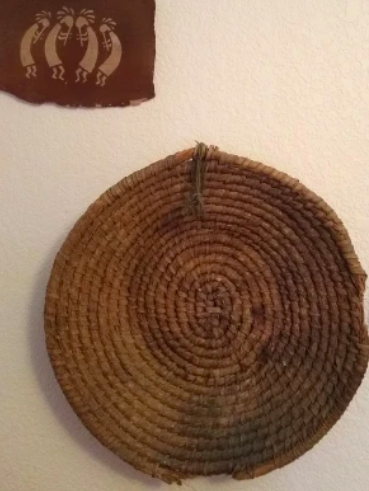Border Talk (9)
My husband stumbled across a backpack about a mile from the ranch left behind by an undocumented immigrant. Ron brought it home where we opened it together. Inside we found a few t-shirts, a pair of underwear, and a baseball cap. We also retrieved a phone with cords, a charger, and an extra battery. Phones are essential for human traffickers and drug runners who are moving cargo. These criminals often strap carpet remnants to the soles of their shoes allowing them to traverse the desert undetected. The carpet booties we pulled from the pack were hand-sewn and resembled moccasins. The owner of the backpack was most likely spotted by Border Patrol agents and opted to leave his things behind rather than risk getting caught. These packs are strewn across the border landscape like archaeological talismans of a troubled present-day civilization many of us ignore.
I shook the pack to make sure it was empty, and a piece of quartz fell to the floor. This was the real story; a clue to the pack’s owner. Before finding the quartz, I imagined a hardened criminal strapping on the booties over his shoes. Someone stout and muscular with cruel eyes and powerful hands who wore a pistol at his hip. This was the kind of person I could reason into existence. A camo-clad criminal who preyed on the weak and who might show up on our doorstep in the middle of the night. The thought of this guy traveling so close to our house left me examining each item in the pack as though Ron had unearthed a monster in our midst.
What kind of drug runner would pick up a dusty piece of quartz? Certainly not a grown man with evil in his heart. I looked over the clothing again and realized that the t-shirts were size small, and the baseball cap was fitted for someone much smaller than me. The pack most likely belonged to a kid who had been recruited by cartel members to smuggle drugs. I imagined a boy maybe fifteen or sixteen crossing the desert, shielded from detection under a night sky. Alone and afraid, he may have wandered off the trail he had been instructed to follow. I wondered who he had left behind. Was his mother at home crying because her son did not come home from school? Did this boy agree to smuggle drugs because the money would help his family or because someone big and scary wielded a knife? Did he cross the border because he saw no other future for himself?
My mother has a Native American basket hanging on a wall in her spare bedroom. My grandparents found it in the attic of their first home, a farmhouse not far from Green Bay, Wisconsin. The people who sold them the house had left it behind. I stay in that room when I visit my mom and have often contemplated the basket. It’s utilitarian, void of decoration. My grandparents purchased the house during the Great Depression. People in that part of the country were getting up in the morning hungry and out of options. Over weak coffee, many families agreed to flee their farms in hope of finding work in the city. A basket like that would not have been considered a necessity or an heirloom, so it didn’t find its way into a moving box. It was probably made by an Oneida Indian woman and found on the property when the fields were cleared for farming in the late 1800’s. I am surprised my grandma didn’t throw it out. She wasn’t one to collect things unless it was tied to her Irish heritage. In any case, I am the beneficiary of her wisdom to hold onto it and to pass it down to my mom. It is a reminder of the past and our part in it. The Oneida lost much of their land in bogus state treaty deals. The 18,000-acre Reservation southwest of Green Bay is a fraction of the land they once occupied. Like the booties, I may not know the maker of the basket, but both items represent a dark time in American history. A sort of cultural complacency that has allowed for injustice to occur on this soil.
Ron and I threw out the contents of the backpack, but we held onto the booties. They are the physical evidence of our nation’s shared role in agreeing to turn a blind eye to poor kids smuggling drugs across a desert border because their lives and those of their families depend on it. Like the basket, the booties are also evidence for future generations to contemplate.
The piece of quartz has a prominent space on our mantle, a reminder that I can always do better.



